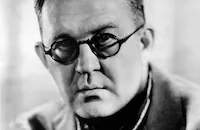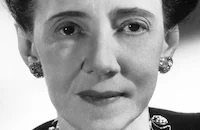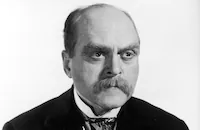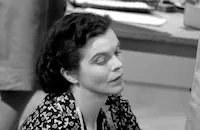Tobacco Road

Brief Synopsis
Cast & Crew
John Ford
Marjorie Rambeau
Gene Tierney
William Tracy
Elizabeth Patterson
Dana Andrews
Film Details
Technical Specs

Synopsis
The downtrodden Lester family lives in rural Georgia on once-prosperous farm land, now fallow, which lies alongside the old tobacoo road. The head of the family is Jeeter, a shiftless man who is always making grand plans but never following through with them. The other Lesters are Jeeter's hard-working wife Ada; their daughter Ellie May, who is a spinster at twenty-three; their high-strung son Dude, who is obsessed by automobiles; and Jeeter's silent, browbeaten mother. The Lesters are constantly on the verge of starvation, and one afternoon, when they are visited by Lov Bensey, who is married to Jeeter and Ada's daughter Pearl, the family attacks him and steals his bag of turnips. Soon after, Jeeter hears a rumor that Captain Tim Harmon, for whose father Jeeter used to farm, is coming to the tobacco road. Believing that Tim will extend credit to the farmers, Jeeter becomes convinced he can restore his farm, and in order to clear his conscience, confesses stealing the turnips to Sister Bessie, a local revivalist. Soon after, however, Jeeter meets Tim and banker George Payne, who explain that Tim is broke and subsequently, the bank has taken over his land, including that on which the Lesters live. Payne tells Jeeter he has to pay $100 rent for the year, but Jeeter has not brooded on the matter for long when it appears that his problem will be solved. Sister Bessie, who was recently widowed, announces that she heard a voice telling her to marry Dude, despite the wide disparity in their ages. Jeeter, knowing that Bessie's husband left a substantial amount of insurance money, agrees to the match, but his scheme to borrow the rent from her is thwarted when Bessie spends all of her $800 inheritance on a new automobile for Dude. Later, Jeeter talks Dude and Bessie into taking him to Augusta to sell a load of firewood, and when no one buys the wood, he convinces the newlyweds to stay overnight in a hotel. While Dude and Bessie sleep, Jeeter steals the car, which has become increasingly dilapitated through careless treatment, and attempts to sell it. He is picked up by the chief of police, however, and the car is returned to Dude and Bessie. Jeeter then returns home, and he and Ada prepare to leave for the poor farm, a depressing, government-run home for paupers. Lov arrives, and after informing them that Pearl has run away to work in the cotton mills, is persuaded by Jeeter to take Ellie May home to care for him. Tim drives by as Jeeter and Ada are walking to the poor farm and takes them back to their home. Although he can barely afford it, Tim has given Payne six months' rent on the Lester farm, and now gives Jeeter ten dollars for seed and fertilizer. Jeeter promises to make good, but after Tim leaves, tells Ada that he will attend to his big plans "pretty soon."

Director

John Ford
Cast

Marjorie Rambeau

Gene Tierney
William Tracy

Elizabeth Patterson

Dana Andrews

Slim Summerville

Ward Bond

Grant Mitchell
Zeffie Tilbury
Russell Simpson
Spencer Charters

Irving Bacon
Harry Tyler

Charles Halton
George Chandler
Erville Alderson
Francis Ford
Jack Pennick

Dorothy Adams
Robert Shaw
Crew
James Basevi
Harry Brand
Vincent P. Bryan
Gene Bryant
David Buttolph
Richard Day
Ed Ebele
Fred Etcheverry
Charles H. Gabriel
Eugene Grossman
Roger Heman
Nunnally Johnson
Harry Kernell
William Koenig
Thomas Little
Barbara Mclean
Arthur Miller
George A. Minor
Ray C. Moore
Edward O'fearna
Carrie O'neill
Ina Duley Ogdon
Knowles Shaw
Harry Von Tilzer
Darryl F. Zanuck

Film Details
Technical Specs

Quotes
Why, Ada here never... never spoke a word to me for the first ten years we was married. Heh! Them was the happiest ten years of my life.- Jeeter Lester
I want a young wife. I ain't gonna take no 23 year old woman for a wife, have everybody laughin' at me.- Lov Bensey
I ain't tradin' turnips with nobody.- Lov Bensey
Trivia
The play by Jack Kirkland opened in New York on 4 December 1933 and set a record for longevity on Broadway.
The movie was banned in Australia for unspecified reasons, but generally had few censorship problems.
Notes
The following information about this production comes from the Twentieth Century-Fox Records of the Legal Department, located at the UCLA Arts-Special Collections Library, the file on the film in the MPAA/PCA Collection at the AMPAS Library, a January 14, 1941 studio press release and Hollywood Reporter news items: Several studios expressed interest in acquiring the rights to Jack Kirkland's play and Erskine Caldwell's novel, both of which were popular, but also very controversial. On December 5, 1933, the night after its New York City opening, the play was attended by a PCA official, who reported, "this play contains about everything which would make it very objectionable as a motion picture." RKO, which May have been the first studio to acquire an option on the properties, was discouraged by the PCA from pursuing the project. According to a March 3, 1940 New York Times news item, RKO had intended to purchase the play for Charles Laughton, who was to play "Jeeter." In 1939, Republic was informed by PCA official Joseph I. Breen: "The material, in our judgment, is definitely and specifically in violation of the Production Code and is, likewise, enormously dangerous from the standpoint of political censorship." Columbia was advised in March 1940 that the title Tobacco Road was on a list of banned titles because the play was "consistently considered unsuitable material." Warner Bros. also was interested in the properties and entered into negotiations with Kirkland, but apparently was discouraged by the PCA's intimation that the title would not be available for use.
By July 1940, Twentieth Century-Fox had intensified its efforts to acquire the screen rights and was concerned that a film based on the play would be banned in England, as the play had been. According to an August 18, 1940 New York Times article, Twentieth Century-Fox's purchase of the play ended "seven months of bidding for the property, in which RKO was the chief competitor." The article speculated that the studio's success with The Grapes of Wrath "influenced the Hays office to sanction the purchase," and that it was "possible that Henry Hull, who created the role of Jeeter Lester on Broadway, [would] be borrowed from [M-G-M] to play the role on the screen." On October 13, 1940, New York Times reported that Hull, Walter Brennan and "even" Henry Fonda were under consideration for the role of "Jeeter," and on October 30, 1940, Hollywood Reporter stated that the picture was "slated for" Fonda. The studio settled the acquisition on November 7, 1940, and agreed to pay Kirkland $150,000 against a percentage of the gross receipts.
In discussing a November 6, 1940 temporary script submitted by the studio, Breen warned that "many religious folk throughout the nation May be offended by the religious aspects." Breen advised the studio to "secure the counsel of an intelligent Protestant clergyman as to the likely reception of the picture, as now drafted, among church-going folks generally," and also cautioned against portraying the relationship between "Lov" and "Ellie May" as overtly sexual. While casting was in progress, which included testing Fred Stone for "one of the top roles," according to an October 1940 Hollywood Reporter news item, the PCA continued to evaluate the submitted screenplays. In late November 1940, Francis S. Harmon, a PCA official from the South, who had written extensively on religious matters, wrote a memo to Breen outlining his concerns about the potential impact of the film's treatment of religion. Harmon concluded: "Most serious is the fact that the laughter in the theatres [provoked by the extreme religiosity of the characters] will give point to the charge that a Hollywood 'filled with Godless sophisticates,' 'foreigners,' and 'Jews' is capitalizing this opportunity to make fun of all religion and by disgusting moviegoers with this screen exposition of an admittedly superficial, highly emotionalized type of religion, is doing a disservice to all religion."
In order to avoid any pre-judgment of the film's screenplay, the studio decided to film on location at Sherwood Forest, CA, rather than in Augusta, GA, as had been originally planned. The "poor farm" sequences were shot on location at Encino, CA. Marjorie Rambeau was borrowed from M-G-M for the production. Although a January 9, 1941 studio billing sheet includes Charles Waldron (Mr. Lester) and Charles Trowbridge (Rector) in the cast, they appeared only in a sequence that was cut from the film, in which "Jeeter" requests help from his son "Tom." The Variety review listed the film's running time as 91 minutes, but this length is probably an error.
Upon its release, the film encountered very few censorship problems, apart from being banned entirely in Australia for unspecified reasons, and was successful at the box office despite mixed reviews. A March 6, 1941 Hollywood Reporter news item noted that the play's controversial nature May have helped the film in the end: "Tobacco Road is getting away to a big start in New England as a result of the wide open exploitation possibilities offered by the censorship situation here. All the New England censor boards passed the picture but, by contrast, the stage play was banned throughout this part of the country except in four cities. As a result, the exhibitors are capitalizing plenty on the chance to see the film version of the long-barred play." According to the legal records, the film had grossed almost $1,900,000 by 1973.












